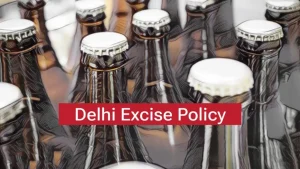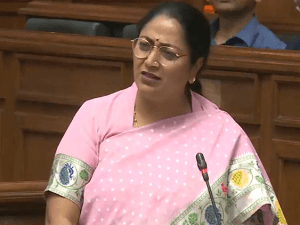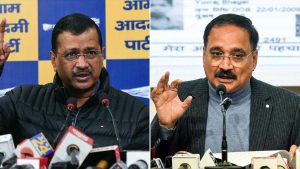New Delhi – Chief Minister Rekha Gupta has announced plans to introduce a “foolproof” excise policy for Delhi, promising a comprehensive overhaul of the capital’s liquor regime. The announcement comes as part of a broader initiative by the newly elected BJP government to enhance revenue generation while ensuring transparency in governance. Delhi CM Rekha Gupta, who took office just over a month ago after the BJP’s victory over the Aam Aadmi Party (AAP) in February’s elections, emphasized that the new policy would incorporate best practices from other states while avoiding any social disruption.
“The new policy will be transparent and crafted to ensure that it does not lead to social disruption,” Rekha Gupta stated in an interview. The Chief Minister’s comments reflect her administration’s commitment to addressing concerns that plagued previous excise policies, particularly the controversial 2021-22 policy that was withdrawn following a CBI probe into alleged irregularities.
Historical Context of Delhi’s Excise Policy Challenges

The current excise policy, which has been in place since September 2022, was implemented after the scrapping of the previous year’s regime. That policy was withdrawn following a CBI investigation into alleged irregularities, an inquiry that had been recommended by Lieutenant Governor V.K. Saxena. Delhi CM Rekha Gupta’s BJP had made these corruption allegations a central campaign issue during the recent elections, helping the party wrest control from the Aam Aadmi Party after a decade in opposition.
The history of Delhi’s excise policy has been marked by controversy in recent years. The 2021-22 policy, introduced by the previous AAP government, faced significant criticism and legal challenges, ultimately becoming a focal point in the political battle between the BJP and AAP. The alleged corruption surrounding this policy provided substantial ammunition for the BJP’s campaign messaging, which resonated with Delhi voters in the February elections.
Under the current temporary framework, only government-run retail liquor shops are permitted to operate in Delhi, with private players barred from the retail sector. This arrangement was initially meant to be temporary but has been extended several times as authorities work to formulate a more permanent solution. Delhi CM Rekha Gupta’s announcement signals that a more comprehensive and long-term approach is finally in development.
Details of the Proposed Excise Policy Reform
In a review meeting with senior excise department officials this week, Delhi CM Rekha Gupta directed them to ensure that the new policy is both “transparent and effective.” According to a senior official who was present at the meeting, the revised policy will be “comprehensive, covering supply management, equitable access across localities, quality control, and pricing transparency.”
The policy is expected to leverage technology for enforcement and focus on plugging revenue leakages, addressing key concerns that have plagued Delhi’s excise revenue collection in recent years. “It will help the government meet its revenue targets while improving the consumer experience,” the official stated, adding that efforts are being made to integrate technological tools for monitoring and compliance.
Last month, the Delhi government extended the existing excise policy until June 30, 2025, to ensure continuity in liquor supply while the revised policy is being formulated. This extension provides the administration with adequate time to develop a well-considered approach rather than rushing into implementation.
Currently, Delhi has approximately 700 liquor stores, all operated by government agencies including the Delhi State Industrial and Infrastructure Development Corporation (DSIIDC), Delhi Tourism and Transportation Development Corporation (DTTDC), Delhi Consumer’s Cooperative Wholesale Store (DCCWS), and Delhi State Civil Supplies Corporation Limited (DSCSC). The new policy may potentially reintroduce private sector participation under a more stringent regulatory framework, though officials have not yet confirmed this detail.
Learning from BJP-Ruled States
A notable aspect of Delhi CM Rekha Gupta’s approach to excise policy reform is the directive for excise department staff to study policies from other BJP-ruled states and adopt their most effective features. This collaborative approach suggests a desire to implement standardized practices that have proven successful elsewhere, potentially creating greater consistency in liquor regulation across BJP-governed regions.


“The formulation of the new excise policy is currently at a very nascent stage. The finer details will be worked out soon and submitted to the competent authorities for approval,” an official told reporters, requesting anonymity due to the preliminary nature of the discussions.
The approach of drawing from successful models in other states reflects a pragmatic governance style that prioritizes effective implementation over ideological considerations. By examining what has worked well in other regions, Delhi CM Rekha Gupta’s administration hopes to avoid potential pitfalls and accelerate the development of a robust regulatory framework.
Broader Policy Initiatives Under the New Government
The excise policy reform is just one component of a broader policy overhaul being undertaken by the month-old BJP government in Delhi. In earlier comments, Delhi CM Rekha Gupta indicated that several policy initiatives were in development.
“We are working on it right now, but it is a work in progress. We are just a month-old government, so it’s too early to disclose specifics. Other policies, such as industrial and warehouse policies, are also being developed,” she had stated.
This multifaceted approach to policy development indicates that the new administration is taking a comprehensive view of governance challenges in the capital. Rather than addressing issues in isolation, Delhi CM Rekha Gupta appears to be pursuing a coordinated strategy that recognizes the interconnected nature of urban governance challenges.
Urban Safety and Infrastructure Improvements
Beyond excise policy reform, Delhi CM Rekha Gupta’s office announced significant urban infrastructure and safety initiatives following a review meeting on Friday. The government has committed to illuminating 4,000 dark spots across the city and resolving traffic congestion at 233 identified points.
“In a metropolitan area such as Delhi, an efficient and secure traffic system is essential,” Gupta stated, highlighting the importance of these infrastructure improvements for both safety and mobility in the capital. The announcement revealed that 41 out of 123 congestion points managed by the Public Works Department (PWD) have already been resolved, with the remaining expected to be cleared by June.
This focus on urban safety is particularly significant in Delhi, which has faced persistent challenges related to women’s safety and crime prevention. By addressing dark spots and improving lighting in vulnerable areas, Delhi CM Rekha Gupta’s administration is taking concrete steps to enhance security in public spaces.
Comprehensive Approach to Urban Challenges
The review meeting also addressed several other critical urban issues, including waterlogging, mobile connectivity at dark spots, and the condition of night shelters for the homeless. Departments have been instructed to repair faulty lights at 1,900 spots within ten days and address poor mobile coverage at 129 locations across the city.
These initiatives reflect a holistic approach to urban governance that recognizes the diverse challenges facing residents of the national capital. By simultaneously addressing multiple infrastructure and service delivery issues, Delhi CM Rekha Gupta is demonstrating a commitment to comprehensive urban improvement rather than piecemeal solutions.
The focus on mobile connectivity is particularly noteworthy in an increasingly digital society, where access to mobile services is essential for both safety and economic participation. By identifying and addressing connectivity gaps, the administration is working to ensure that digital infrastructure keeps pace with other urban improvements.
Social Welfare and Governance Innovations
The Delhi government has also outlined plans to enhance social welfare services and strengthen governance mechanisms. District officials have been instructed to step up inspections of shelter homes for the homeless, ensuring that these vulnerable populations receive adequate support and protection.
Additionally, Delhi Police will carry out fortnightly identity verification drives, enhancing security measures throughout the city. The government will also launch a crackdown on polluting vehicles, addressing environmental concerns that have long plagued the national capital.
Perhaps most significantly, Delhi CM Rekha Gupta’s administration plans to establish Jan Samitis (People’s Committees) at police stations to ensure direct public engagement in governance. This innovative approach to community policing could potentially transform the relationship between citizens and law enforcement, creating more responsive and accountable security services.
Political Implications of Policy Reforms
The comprehensive policy reforms being pursued by Delhi CM Rekha Gupta carry significant political implications. Having campaigned heavily on anti-corruption messaging and promises of improved governance, the BJP government now faces the challenge of delivering tangible improvements that justify the faith placed in them by Delhi’s voters.
The excise policy reform, in particular, carries both opportunities and risks. If successfully implemented, a transparent and revenue-enhancing liquor policy could demonstrate the administration’s competence and commitment to good governance. However, any missteps or controversies surrounding the new policy could potentially undermine the government’s credibility, particularly given how central excise policy corruption allegations were to the BJP’s election campaign.
The broader urban improvement initiatives, including traffic decongestion and enhanced lighting, offer more straightforward political benefits. These visible improvements to daily life in the capital could help solidify support for the new administration and demonstrate a commitment to addressing citizens’ everyday concerns rather than focusing solely on high-profile policy changes.
Challenges in Implementation
Despite the ambitious nature of these policy announcements, Delhi CM Rekha Gupta’s administration faces significant challenges in implementation. The complex administrative structure of Delhi, where power is divided between the elected government, the Lieutenant Governor, and various municipal bodies, can complicate policy execution.
Additionally, the relatively short timeframe outlined for some initiatives—such as the ten-day deadline for repairing faulty lights—will test the administration’s ability to mobilize resources and coordinate across departments. The success of these early initiatives will likely set the tone for public perception of the government’s effectiveness.
Financial constraints may also pose challenges, particularly for infrastructure-intensive projects like traffic decongestion and dark spot illumination. The administration will need to balance these capital investments with ongoing operational needs and other policy priorities.
Stakeholder Reactions to Announced Reforms
Reactions to Delhi CM Rekha Gupta’s policy announcements have been mixed among various stakeholders. Industry associations have cautiously welcomed the promise of a more transparent excise policy, though many are awaiting specific details before offering more definitive responses.
Consumer advocacy groups have emphasized the importance of ensuring that any new liquor policy prioritizes public health and responsible consumption alongside revenue considerations. Some have called for enhanced regulations around advertising and sales practices to minimize potential social harms.
Opposition parties, particularly the Aam Aadmi Party, have questioned whether the BJP government can deliver on its promises, pointing to what they characterize as a gap between the party’s campaign rhetoric and its governance record in other states. They have also raised concerns about the potential privatization of liquor sales, suggesting that this could lead to increased prices for consumers.
Timeline for Policy Implementation
While specific implementation timelines vary across the announced initiatives, Delhi CM Rekha Gupta’s administration has provided some indication of expected progress. The traffic decongestion efforts, for instance, are slated for completion by June, representing an ambitious three-month timeframe for addressing the remaining congestion points.
The excise policy development appears to be on a somewhat longer timeline, with the current policy extension running until June 30, 2025. This suggests that the administration is taking a more deliberate approach to this complex regulatory framework, prioritizing thoroughness over speed.
Other initiatives, such as the repair of faulty lights and establishment of Jan Samitis at police stations, have been given more immediate timelines, indicating a desire to demonstrate early progress on visible quality-of-life improvements.
Comparative Analysis with Previous Administrations


Delhi CM Rekha Gupta’s governance approach represents both continuity and change compared to previous administrations. Like her predecessor, she has emphasized urban infrastructure and service delivery improvements, recognizing these as central concerns for Delhi’s residents.
However, the specific focus on transparency and anti-corruption measures, particularly in the excise policy development, reflects the BJP’s campaign messaging and represents a deliberate contrast with the previous government. By emphasizing these themes, Gupta is reinforcing the narrative that brought her party to power while establishing distinct governance priorities.
The approach to engaging other BJP-ruled states in policy development also differs from the previous administration’s governance style, reflecting the party’s ability to draw on experiences from across its national footprint.
The Road Ahead for Delhi’s Governance
As Delhi CM Rekha Gupta’s administration moves forward with its ambitious policy agenda, several key factors will likely determine its success. The ability to translate announcements into effective implementation will be crucial, requiring strong coordination across departments and administrative levels.
Public communication and stakeholder engagement will also play important roles, particularly for complex reforms like the excise policy overhaul. By maintaining transparency around policy development and implementation challenges, the administration can potentially build greater public trust and patience during the transition period.
Perhaps most importantly, Delhi CM Rekha Gupta will need to demonstrate that these reforms genuinely improve daily life for Delhi’s residents, delivering on the promises that brought her party to power. The visible urban improvements, including better lighting and reduced traffic congestion, offer early opportunities to demonstrate this commitment to tangible results.
Final Word: A Comprehensive Governance Vision Takes Shape
The announcements by Delhi CM Rekha Gupta represent an ambitious and multifaceted approach to addressing the capital’s governance challenges. From excise policy reform to urban safety improvements and innovative governance mechanisms, the new administration is attempting to demonstrate a comprehensive vision for Delhi’s future.
While the implementation challenges remain significant, the clear articulation of priorities and specific initiatives suggests a deliberate and structured approach to governance. By addressing both regulatory frameworks like the excise policy and tangible urban improvements like traffic decongestion, Delhi CM Rekha Gupta is attempting to balance systemic reforms with visible quality-of-life enhancements.
As these initiatives move from announcement to implementation, Delhi’s residents will be watching closely to determine whether the new administration can deliver the transparent and effective governance it has promised. The success or failure of these early policy efforts will likely shape public perception of Delhi CM Rekha Gupta’s government and potentially influence its ability to implement more ambitious reforms in the future.

